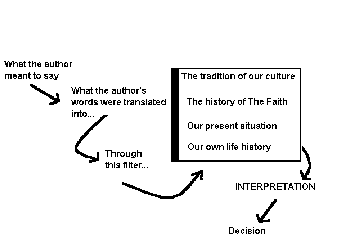| The Bible? A simplistic view of biblical interpretation might be the old saying 'God (or the Bible) said it, I believe it, that settles it.' That is, read the plain words of scripture and follow them. The reality is more complicated. When we read even the simplest biblical passage, something like the drawing below happens. (Please note that I am not suggesting that conservative biblical interpretation is often not well aware of this issue.)
Imagine three people. Greg was a prisoner of war in Changi, under the Japanese. John is twenty years old and grew up in Adelaide in a loving, safe family. Lena is a woman somewhere who saw her husband murdered and is now starving in a besieged city, facing rape and then being shot. The bible says 'You shall not kill', or in some translations, 'You shall not commit murder.' Can we see that each one of the three may have a different response to that text? To interpret the bible carefully and well, we need to be aware of the complexity of our situation. Otherwise John may say 'You should never kill' simply out of naivety of the world. Greg may harbour hidden desires for revenge. Lena may wish simply to stay alive - if someone must die; why her?
Biblical interpretation is never simple, or easy, and usually not quick!
Imagine being at traffic lights in the late afternoon on a bright summer's day. Have you noticed how hard it is sometimes to distinguish whether or not the light is green or red— the sun behind us makes it hard to pick which light is on. Imagine we were all seated there in our car, some of us wearing green sunglasses, some amber, some red. At each change of the light some of us would not be able to see the coloured light which was on because of the filtering effect of our glasses. Red sunglasses would hide the fact that the red light was on. When we read the Bible, or look at homosexuality, or any issue in life..... we always do it wearing filters, or sunglasses. In our particular issue; we cannot do good theology if we assume that the word our bible translates as 'homosexual' was meant by the author to convey what we understand by the word 'homosexual'. We have to do the work of finding out what the author meant, and what that means for us today. And then ask does what I mean by 'homosexual' equate to what the self-identifying homosexual person next to me means? We need to ask how we are influenced by our society's history. A WWII veteran, or a survivor of the 200,000 people massacred by the Japanese in Nanking in 1937, may feel differently about Hiroshima than a young person from Hiroshima who has heard little of the history of their country's aggression. We need to try and discover what things about our society are putting filters over our eyes when we read the bible. Finally, we must look at the whole thrust of the Bible. If we only read the words on punishment for example, we will have a skewed picture of the God who is love. So if we make a decision about anything, let's remember to ask, 'How does this fit into our whole understanding of the nature of God?' |
